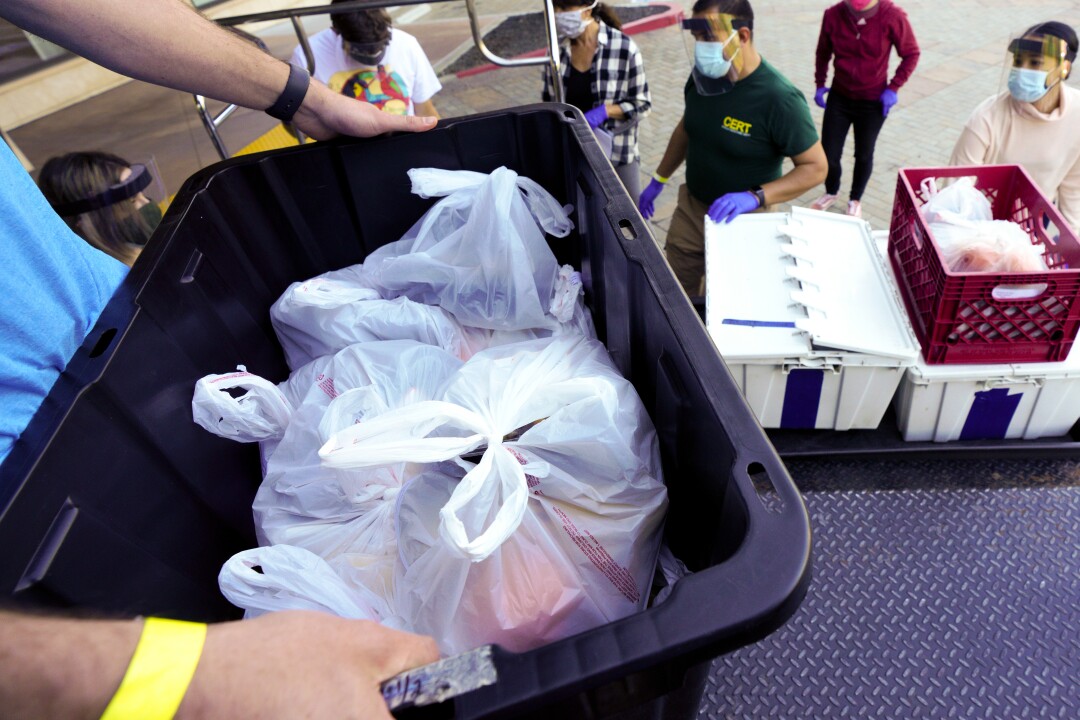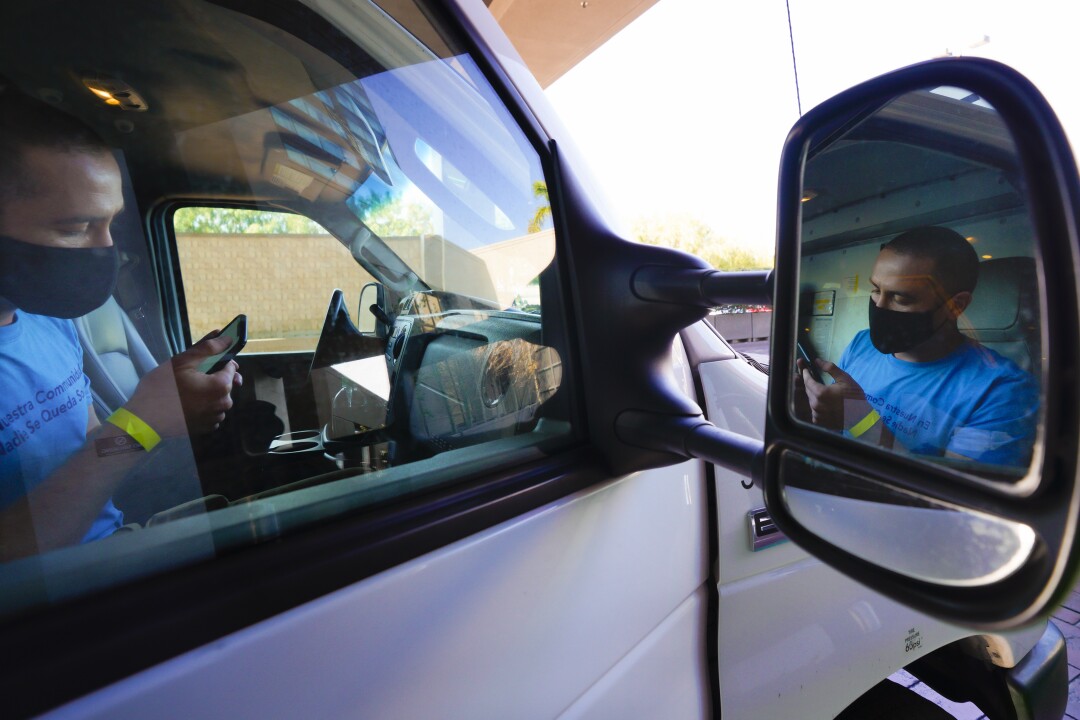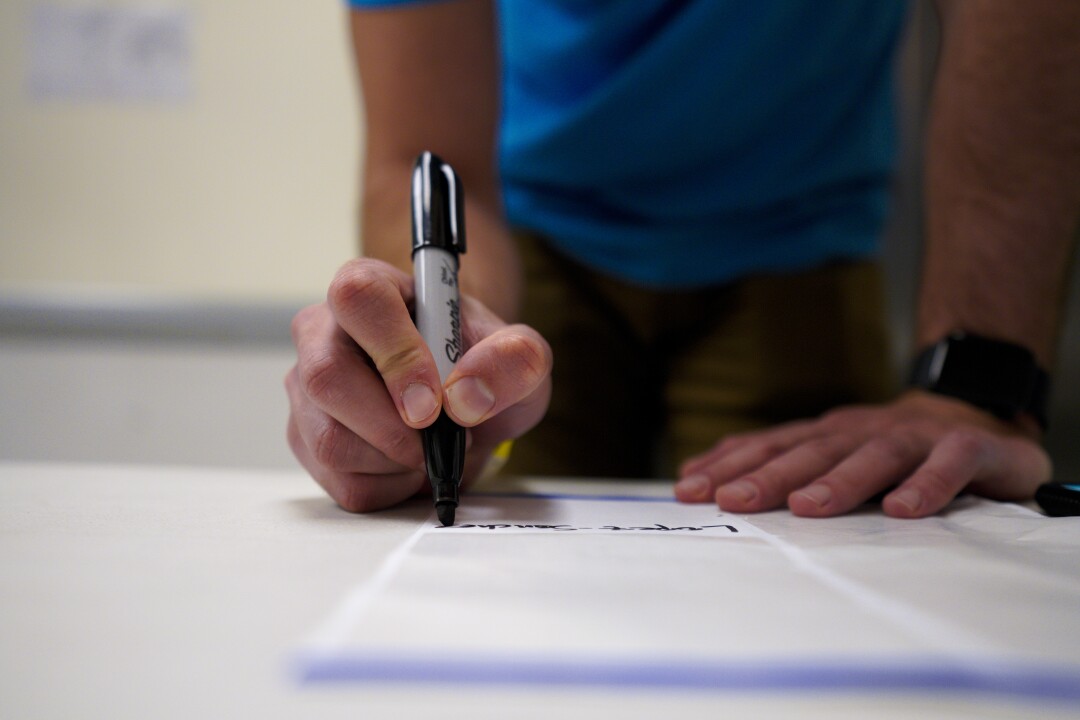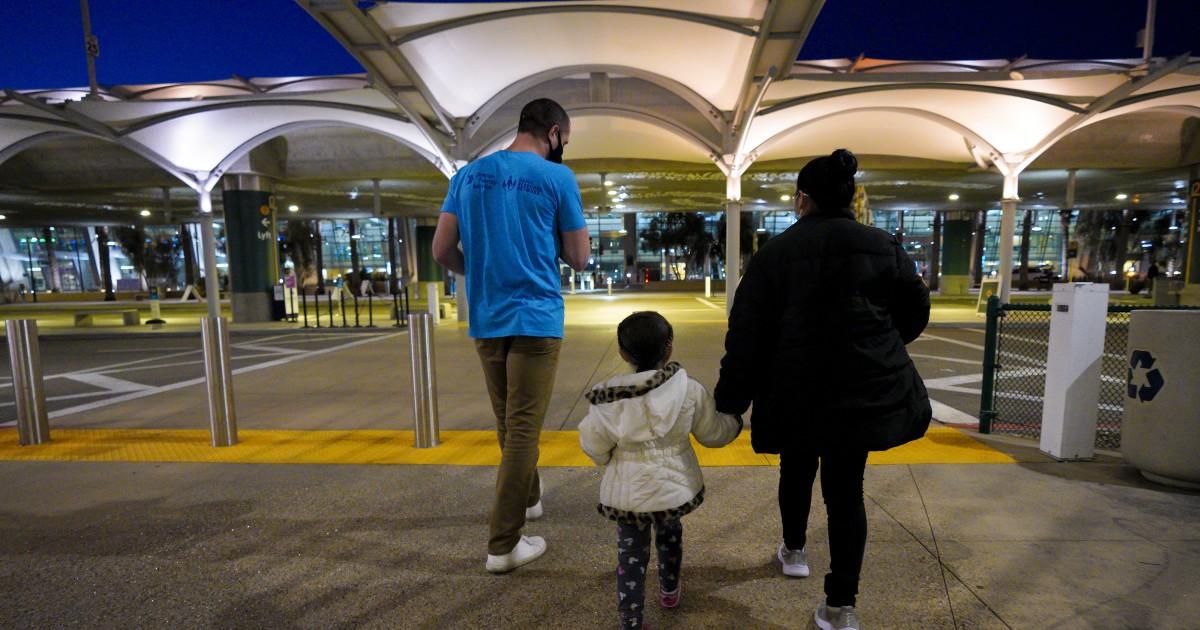Eitan Peled has a collection of new airport selfies, but he hasn’t traveled anywhere recently.
The photos document asylum seekers’ final moments in San Diego before they board planes to reunite with loved ones they’ve spent sometimes years trying to reach. In those moments, the new arrivals are finally at ease, letting go of nerves that rode with them even in the van to the airport.
Peled uses the pictures to keep track of days that have blurred together as he and other Jewish Family Service staff push themselves to support as many asylum seekers as possible who are passing through the organization’s migrant shelter program.
While unaccompanied migrant children who were apprehended by Border Patrol are set to arrive soon at the San Diego Convention Center, asylum-seeking families have been sheltered in the city for years by Jewish Family Service. The shelter recently put out a call for more staff and volunteers to help make travel arrangements, hand out meals and guide newcomers through San Diego’s airport as the number of asylum seekers released into the area has increased in March.

A young child accepts a food delivery from Eitan Peled at a local shelter.
(Nelvin C. Cepeda / The San Diego Union-Tribune)
In the meantime, shelter staff are working around the clock to rebuild the shelter’s capacity after months of decreased need during the pandemic, all while navigating the additional logistical complications of COVID-19 precautions.
“Every time we travel a family out, that’s another family that we can accept,” Peled said.
That knowledge keeps him working seven days most weeks.
The shelter first opened in late 2018 when the Trump administration stopped immigration officials from helping asylum-seeking families make travel arrangements to reach their final destinations in the United States and began releasing those families at bus and trolley stations with no support.
When the pandemic began and the Trump administration issued an order, known as Title 42, that meant officials could immediately expel border crossers back to Mexico or their home countries, the number of families coming to the shelter dwindled.

Standing on the back of the truck, Eitan Peled coordinates food deliveries with a group of volunteers.
(Nelvin C. Cepeda / The San Diego Union-Tribune)
But beginning in November, the number of people staying at the shelter — restructured post-COVID to hotel rooms instead of the communal sleeping space from before the pandemic — slowly increased again.
In February, Jewish Family Service began receiving asylum seekers who had been placed in the Trump administration’s “Remain in Mexico” program, known officially as Migrant Protection Protocols or MPP, as part of President Joe Biden’s wind down of that program. Asylum seekers with active immigration court cases in MPP are being let into the United States in several locations, including the San Ysidro Port of Entry.
At first, the MPP returnees came in groups of 25 per day. That has increased to about 50 per day.
Then, in March, without warning or a clear change in policy from Title 42, the Jewish Family Service shelter began receiving people who had been apprehended by Border Patrol as well, some from as far away as Yuma.
As of March 25, the shelter has received more than 2,000 people this month. That’s up from 490 people in all of February and 144 in January, according to Kate Clark, an attorney with Jewish Family Service.
The nonprofit’s staffing levels were not ready for the change, which has meant long days for Clark, Peled and the whole shelter team.
The shelter staff are glad to be receiving as many people as they are, but Jewish Family Service needs the staffing to make sure that care stays at the quality it should be, Clark said.
“It’s not a crisis,” Clark said. “It’s just a situation.”

Eitan Peled sits in a delivery truck as he coordinates food deliveries and new guest pick-up times.
(Nelvin C. Cepeda / The San Diego Union-Tribune)
While some shelter staff are transporting asylum seekers to the San Diego airport as early as 3:30 a.m., Peled’s days typically start around 7:30 a.m. at the San Ysidro Port of Entry.
Peled, 27, usually wears what he calls his “uniform” — a t-shirt that says “En nuestra communidad, nadie se queda solo.” In our community, no one is left alone.
The former child migration and protection program manager for UNICEF USA hopes the message helps the asylum seekers distinguish him from the law enforcement officials who work for the government. At the port, he and the Jewish Family Service legal team check MPP returnees’ paperwork after the asylum seekers confirm their identities with Customs and Border Protection officers.
Even though the asylum seekers were already tested for COVID-19 the day before at a staging shelter in Tijuana, they are tested a second time at the port of entry by UC San Diego Health medical staff.
Then they file onto a bus that Jewish Family Service staff decorated to help asylum seekers celebrate the moment. The bus drops them off at one of four hotels where the nonprofit has booked rooms, and the asylum seekers quarantine there until they receive their test results.
Clark said she’s seen tears of joy streaming down asylum seekers’ faces as they walk to the bus.
“There’s a moment where they all of a sudden realize they’re not in custody anymore,” Peled added.

Eitan Peled works at the office to prepare in-flight meal bags for the morning and night airport dropoffs.
(Nelvin C. Cepeda / The San Diego Union-Tribune)
Last Friday, among the first that Peled helped onto the bus was a Venezuelan family of three — Meivys, Edixón and their four-year-old daughter. They’d been waiting in Tijuana under the Remain in Mexico program for nearly two years.
Peled was also the staff member who brought lunch to their hotel that day, rolling a hotel cart down the hallway with bottles of water and bags of food that could be heated in the rooms’ microwaves.
“Hallelujah!” one woman exclaimed, laughing, when he knocked on her door to deliver the meal.
Another woman asked in Portuguese about her COVID test results. She’d been apprehended by Border Patrol and released to the shelter, so her COVID test was taken the morning after her arrival. Brazilians are one of the largest groups that the shelter has received in March.
Peled answered her in Spanish, hoping that she would understand because of the similarities between the two languages. She thanked him and closed the door.
Peled sees the work that Jewish Family Service is doing as an intersection between what the asylum system is and what it could be.
“We are operating within the context of a broken immigration system and responding to the needs of vulnerable individuals who are trying to navigate it,” Peled said. “While navigating that broken system, we are advocating for and working to build a system that works better.”
The asylum seekers who are released to the shelter because they chose to cross the border without permission and ended up apprehended by Border Patrol are a symptom of the broken system, he said. The process for winding down the MPP program, which doesn’t require asylum seekers to spend any time in holding cells, he added, could be a blueprint for what custody-free, humane asylum processing looks like in the future.
The shelter where Jewish Family Service served asylum seekers before the pandemic has become a staff hub to store food and supplies as well as the office where workers and volunteers call families to make travel arrangements.
Peled met with Clark there on Friday afternoon to sort out who would pick up asylum seekers being dropped off by Border Patrol that day.
At first, Border Patrol wouldn’t notify shelter staff about people getting released from custody until they were already dropped off at a bus stop, Peled said, and the staff would scramble to send someone to find them.
They’ve since built up communication with agents at the region’s stations to be able to coordinate drop offs, Peled said. As he and Clark talked, another email from Border Patrol came in about additional arrivals.
Peled also escorted Meivys, Edixón and their daughter to the airport on Monday evening.
They and the other asylum seekers he picked up from the two hotels he stopped at with the organization’s 15-passenger van were waiting for him in the hotel lobby when he arrived.

Eitan Peled works at Jewish Family Services of San Diego office to coordinate new guest pick-up times.
(Nelvin C. Cepeda / The San Diego Union-Tribune)
Once in the van, he asked in Spanish, “Who wants to DJ? What artist do you want to listen to?”
“Salsa,” a woman responded after a shy pause.
When Peled pressed her to name an artist, she selected Marc Anthony.
At the airport, he dropped off part of the group at one of the terminals to wait for him while he escorted the other half to their gate. Most were headed to Miami.
A Transportation Security Administration supervisor recognized Peled and came to see what special needs the group had for identity checks. Sometimes the asylum seekers don’t have passports, or their travel documents are expired.
Monday’s group passed through relatively smoothly — only one man had an expired passport. He received an extra screening.
It was only after crossing through security that the asylum seekers began to chat with each other, their tensions finally eased knowing that nothing more stood between them and their flights.
For a mother and daughter from Nicaragua, it was their first time on a plane.
Peled exchanged fist bumps with the group and wished them well before quickly walking back to the other terminal to help the Venezuelan family check in and get through security.
At the gate, their young daughter began snacking on the bag of food that Peled had provided to them for the journey while the couple recalled what they had been through.

Eitan Peled guides a mother and her daughter through security at the airport before their flight to the east coast.
(Nelvin C. Cepeda / The San Diego Union-Tribune)
While in Mexico, they shared an apartment with another Venezuelan woman who had been returned to Tijuana under MPP. They were so afraid of the neighborhood they lived in that they never went outside, Meivys recalled. One of their neighbors was a drug dealer who was raided by military and police.
After the landlord raised rent, they spent the rest of their time in Tijuana bouncing from place to place, staying with whomever would take them in for a time.
“It was difficult, but thank God for putting good people in our path,” Meivys said in Spanish.
When her family received the call that it would be their turn to be processed into the United States, she felt a moment of relaxation for the first time in years. Once in the United States, that feeling deepened. The first night in the San Diego hotel, the family slept until the afternoon.
“What I say to people waiting is to have faith,” Meivys said. “The wait is hard, but it is worth it.”
Her dreams for life in the United States center on her daughter and the opportunities the girl will have here. She joked lovingly about her daughter’s Mexican accent, an effect of the girl spending half her life living there.
Before leaving the family to board the plane, Peled paused to snap his traditional selfie.
On Monday, he wrapped up work close to 11 p.m.
“Tomorrow, we do it all again,” he said.

Eitan Peled guides a mother and her daughter through security at the airport.
(Nelvin C. Cepeda / The San Diego Union-Tribune)

